| [naar
inhoudsoverzicht muziekgeschiedenis]
[naar
inhoudsoverzicht korte biografieen]
[terug naar inhoud Wolf-biografie]
[naar
literatuurlijst]
inhoud:
|
1883-1903
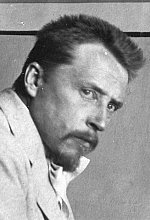
Hugo Wolf 1899
Under the spell of Wagner
1882 was the year of the première of "Parsifal" by
Wagner. Wolf, who had resumed the life of a bohemian, had the ardent wish
to hear "Parsifal" in Bayreuth. He succeeded in getting a complimentary
ticket, friends contributed to the costs of the trip and the accomodation,
and Wagner's music filled him again with great enthusiasm.
As convinced Wagnerian, Wagner was also vegetarian at that time. In
a Viennese vegetarian restaurant he became acquainted with Friedrich Eckstein,
a private student of Anton Bruckner. He was fascinated by Eckstein's
encyclopedic knowledge. The discussions on "Parsifal", German and
Spanish mysticism, Free-masonry and vegetarianism went often on till dawn.
Also the friendship with the Köchert family - from now on he sought
and found refuge in their house at Neue Markt in Vienna when troubles necessitated
it - proved to be an essential support. After a long creative pause, he
composed in December 1882 series of lieder, for the most part adapted
from poems by Joseph von Eichendorff and Robert Reinick. In January
1883, Wolf submitted them to Eduard Hanslick, the mighty and
feared Viennese music reviewer, and he received a friendly, but noncommittal
answer.
Wolf was fascinated by Heinrich von Kleist's "Penthesilea" in
a particular way. He carried the book around with him like a breviary and
quoted long passages with pleasure. He planned to make "Penthesilea"
the theme of a symphonic poem, but at first Wolf did not feel up to the
demands of this subject. Early in 1884, he dropped the attempt to
set it to music to try his hand at new and completely different profession:
as music reviewer.
The reviewer (1884-1887)
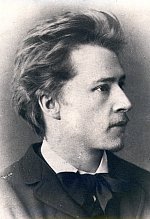
Hugo Wolf 1885
It was due to the influence of the Köchert family that Wolf was
employed with the "Wiener Salonblatt", a high-circulation weekly
paper. The firm of Köchert had business relations with the paper through
its numerous advertisements as court jeweler. The "Salonblatt" saw itself
as the mirror of the Viennese society, covered the balls of the season,
events world of the nobility and provided light entertainment. At first,
Wolf's vehement - uttered in an uncompromising tone - siding with Wagner's
and Liszt's music, his attacks on the conservatism of the philharmonic
programs and on the taste of the Viennese opera public, finally his verbal
invectives against Johannes Brahms, who was highly esteemed in Vienna,
had an upsetting and disturbing affect. But soon violent verbal reactions
drew the attention of large circles to the paper. In the cafés it
passed from hand to hand, it was discussed and read by the Wagnerians with
pleasure and by their enemies with anger. The "wild Wolf" from The
"Salonblatt" became a Viennese institution.
Wolf should soon pay for his uncompromising attacks in the "Salonblatt",
which were impeding his way as composer in Vienna. In 1885, he submitted
his string quartet in D minor ("Entbehren sollst du, sollst entbehren")
to the Rosé-quartet for a first performance and after a while he
was called upon sarcastically to fetch the manuscript at the doorman of
the court opera. At first, he seemed to have more luck with his symphonic
poem "Penthesilea", which was accepted by the Vienna Philharmonic
Orchestra for a test rehearsal on October 15th 1886. Although it
was regarded as a rule that the composer was not allowed to attend the
test rehearsal of his work, Wolf succeeded in entering the hall and listening.
The orchestra decided against the performance of the work. Even days later,
Wolf was beside himself with indignation at the treatment of "Penthesilea"
by Hans Richter, who said to the orchestra: "Gentlemen, I would not
let you play the piece out - but I wanted to see the man who dared to write
about master Brahms like that."
The great lieder cycles (1888-1889)
In April 1887, Wolf retired from the post as critic. From May
2nd to May 4th he composed the "Italian Serenade" for
string quartet. This creative phase was interrupted by a hard blow: Wolf's
father died on May 9th. "In memory of my dearest father" he dedicated six
lieder adapted from texts by Scheffel, Mörike, Goethe
and J. Kerner, which were published in 1888 with Friedrich
Eckstein's help by the Wiener Musikverlag Wetzler. These lieder excited
the interest of the young conductor Franz Schalk, whose brother Josef became
soon Wolf's most engaged protagonist.
"In winter 1988, have caught on after a long hunting around. In
the quickest succession composed Mörike, Eichendorff and Goethe..."
In this way Wolf characterized himself in retrospect the beginning of the
most creative phase of his life, from which his most noted works derived.
In January 1888, he set at first "Wo wird einst" by Heinrich
Heine and "Gesellenlied" by R. Reinick to music at the country
house of the Werner family in Perchtoldsdorf near Vienna, like for getting
himself in the right frame of mind. The setting to music of 43 poems by
Eduard Mörike followed in the short period from February 16th
to May 18th. He composed often two or three poems a day.
Proud consciousness of the own rank within the history of music filled
the letter to Josef Strasser dated March 23rd: "What I am composing
now, dear friend, I compose it already for the posterity too. They are
masterworks." A similar frenzy of production happened again from September
1888 to February 1889. On the banks of the Traunsee, the Eichendorff-lieder
of earlier creative phases were enlarged with new settings to music to
a volume of twenty lieder, which was dedicated to the brothers Franz and
Josef Schalk.
In October 1888, he composed another nine Mörike-lieder.
With a 53rd lied the Mörike-volume was closed on a visit in Perchtoldsdorf.
In the meantime, Wolf dealt feverishly with the composition of poems by
Goethe. From October 27th to February 12th 1889 he set fifty
texts by Goethe to music. A circle of friends became familiar with each
newest creation. The students under Bruckner Friedrich Eckstein
and Ferdinand Löwe belonged to them and the Schalk brothers
as well.
On the way to international fame - "Italienisches Liederbuch" (1889-1891)
In the Viennese academic Wagner association Josef Schalk, since
1887
its artistic manager, started an active publicity campaign for Wolf. Improvised
performances of works by Wolf at the meetings on Thursday evening became
frequent events. Schalk supported Wolf so in such a marked manner that
some members began to grumble about the "Wolf-gorge" and asked mockingly
for renaming the association into "Wolf-association".
On January 22nd 1890, the "Münchner Allgemeine Zeitung"
published an item on Wolf, which made him well-know in the circles of musicians
in South Germany: "Neue Lieder, neues Leben". Its author, Josef
Schalk, presented the Mörike-lieder by Wolf. After praising highly
the Swabian poet, he pointed out the kindred lied style of the composer
sympathizing the poetry down to the last detail. Furthermore, Wolf could
not be blamed for taking Wagner as an example and his conversion of these
stylistic means was free of any imitation. Through the item, Wolf won important
friends i South Germany, among others Emil Kauffmann from Tübingen
and Oskar Grohe, a judge from Mannheim. On September 25th 1890,
Wolf began to compose the "Italienisches Liederbuch". But at first,
he composed only four lieder, because he paid a visit to his new friends
in Germany in October.
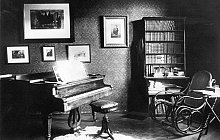
Study work Hugo Wolf
Delighted about the interest his works had met in Germany, Wolf composed
another three lieder of the "Italienisches Liederbuch" in Döbling,
but interrupted this work, because the Burgtheater charged him with the
composition of the music for Ibsen's drama "Das Fest auf Solhaug".
The creative crisis of the coming years cast their shadows before them:
Without inspiration, Wolf strove with the commissioned work till February
1891. The performance did take place in November, but an essential
part of the music fell a prey to radical cuts. A feverish working phase
set in once again. From November 29th on, Wolf composed another
fifteen parts of the "Italienisches Liederbuch" within only 25 days.
But now began a harrowing period of creative sterility, which ended only
in April 1895.
Creative pause (1892-1894)
The inner compulsion to compose, for Wolf an essential to creation,
did not turn up again. The composer had to make do with revisions of own
earlier works, for example the instrumentation of the "Italienisches
Liederbuch" for small orchestra or the ballad "Der Feuerreiter"
for choir and full orchestra. The time of creative barrenness was filled
with traveling. In March 1892, Wolf went to Berlin to a Wolf lieder
recital, which scored a success with the public and the press. The acquaintance
of the conductor Siegfried Ochs turned out to be valuable: Two years later,
he helped Wolf's orchestrated lieder achieve the breakthrough. Richard
Genée gave him advice in a question, which occupied Wolf's mind
for a long time: the search for an appropriate matter for an opera. Genée
called his attention to the subject of "Manuel Venegas" by Alarcón.
After trips through Germany, to the Köcherts family on the banks
of the Traunsee and to Count von Lipperheide in Tyrol, Wolf returned exhausted
to Vienna. The health of his nerves has seriously deteriorated. Eckstein
noticed the sometimes paranoid behavior of his friend: Wolf talked - shouting
and cursing - to himself and tore out the hair of the beard. |
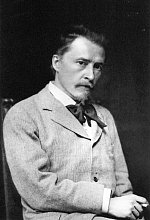
Wolf 1892
|
"Der Corregidor" and "Manuel Venegas" (1895-1896)
Wolf's year-long search for an appropriate opera text ended early in 1895.
He spoke with delight on the libretto "Der Corregidor" by Rosa Mayreder,
based on the novella "Der Dreispitz" by Pedro de Alarcón. It was
the result of a sudden change of opinion, because this libretto was already
know to him. He had refused it categorically at the first reading.
Financial worries were removed by an annual subvention by Count Lipperheide
and some other friends. Now, Wolf could devote himself totally to the composition
of his first stage work. The task caused a new creative phase in him: On
March 12th, he began to compose, within four months he finished the
piano score and within another five months he wrote the whole partition.
After vain attempts to stage the work in Vienna or Prague, it was performed
for the first time at the Mannheim National Theater. The première
on May 17th 1896 scored a success with the public. However, the
composer could hardly be persuaded to thank for the applause, because numerous
details of the performance displeased him.
"Der Corregidor", one
of the few examples of an amusing German opera after Wagner, could not
win through as repertory work in the sequel. Weaknesses of text were held
responsible for that, but also Wolf's tendency to emphasize lyric passages
to the disadvantage of the dramatic course. In March 1897, Wolf
composed his last lieder, three sonnets by Michelangelo. In the meantime,
Rose Mayreder had begun to convert Alarcón's novella "Manuel
Venegas" into an opera libretto. Wolf was enthusiastic again about
the draft, but the friends advised him against the setting to music. Moritz
Hoernes wrote a new book, which turned out to his greatest satisfaction.
On July 1897, he began to compose the spring choir of the opera.
In all, he wrote fifty pages of the piano score till September. Then Wolf
fell a prey to his tragic illness. "Manuel Venegas" remained a fragment.
Breakdown (1897)
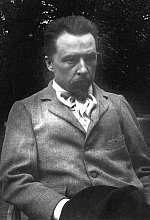
Hugo Wolf 1899
Wolf expected of Gustav Mahler, who was appointed as conductor
in May 1897 and from September on as director of the Vienna Court
Opera, the support of his works, in particular the performance of his "Der
Corregidor". A conversation with Mahler, who had already acceded to
his office as provisional director of the opera, unleashed the catastrophe:
Mahler spoke disparagingly about Wolf's opera and was doubtful about the
possibility of an early performance. Wolf left the director's office extremely
agitated and embittered. The delusion fixed itself in his mind that he
himself was the new director of the opera and that he could remove by dismissing
Mahler the last obstacle to the performance of his "Der Corregidor" in
Vienna.
Wolf's loss of reality became apparent to the friends, when he played
them parts of "Manuel Venegas" on September 20th. He maintained
being the director of the Viennese opera house and began to distribute
posts and jobs. They brought him in his apartment in Vienna and let him
go on thinking that he would be brought to the Controller the next day.
In actual fact, the ordered carriage took him to Dr. Svetlin's mental home
in the third district. In the sanatorium, his megalomania and his persecution
mania subsided at first. He instrumented two lieder from the "Spanisches
Liederbuch" and dealt with additions to "Penthesilea" and "Italienische
Serenade". He thought that he was cured, when he was discharged on
January
24th 1898.
In May, he moved to Traunkirchen, where another tragic incident happened:
Wolf made a suicide attempt in the Traunsee. Realizing his own psychic
situation, he asked now himself for internment. He was admitted to the
Lower-Austrian Provincial lunatic asylum in Vienna. The Viennese Hugo Wolf
association by means of payments by the friends from Austria and Germany,
but also by the Austrian emperor and the Ministry of Culture and Education
provided for Wolf's keep.
Tragic epilogue (1898-1903)
At the Provincial lunatic asylum, Wolf's state deteriorated at first. Phases
of total absence of mind and delusions came by turns. Wolf raved in delirium
about Brahms and his fear that his body will be dismembered. Early
in 1899, there was a change for the better again. He was visited
by friends and a piano was made available to him in his room. Short drives
with friends interrupted the dismal monotony of the daily round at the
home.
| But after the summer 1899 his state made drives and the occupation
with music impossible. The progression of the illness brought new delusions
about. Wolf refused to eat and could only sleep by means of drugs. Paralytic
symptoms grew worse. His handwriting became illegible. Difficulties to
speak set in and sometimes he was totally incapable of speaking. On February
22nd 1903, Wolf died of pneumonia. He received a tomb of honor at the
Wiener Zentralfriedhof (central cemetery of Vienna) close to tombs of Beethoven
and Schubert. The gravestone by Edmund Hellmer was formally unveiled in
October
1904. |
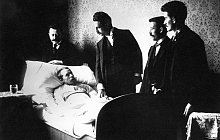
Hugo Wolf
|
|